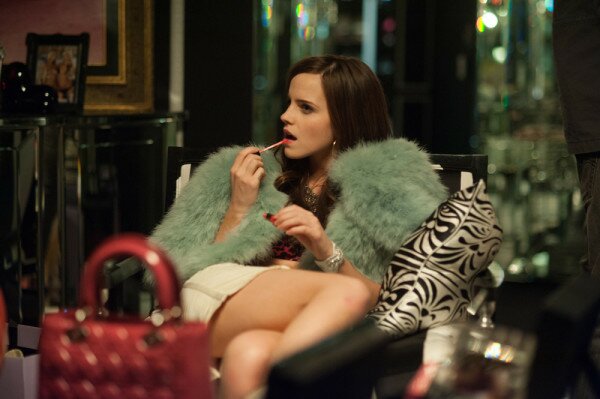Ours is a caustic era, obsessed with celebrities and the so-called lifestyles they enjoy. We image they exist in a perpetual flow of brand-name exuberance, gliding seamlessly from one A-list party to the next. We enjoy their every move vicariously via the endless stream of paparazzi images that feed our collective bloodstream through the poisoned, rusty needle of the tabloid press.
But, every excess breeds envy amongst those close enough to understand what the this life can offer, yet unable to reach for it themselves. The Bling Ring traces the true story, adapted from a Vanity Fair piece by Nancy Jo Sales, of a group of Hollywood teenagers who take decide to claim their slice of the celebrity lifestyle, by breaking into the homes of stars like Paris Hilton and Lindsay Lohan.
Much has been written about The Bling Ring’s superficiality, the flaw supposedly being this film’s lack of likeable or well drawn characters, at least when compared to Sofia Coppola’s other films like Lost In Translation or Somewhere.
This is partly a valid point, since the young people in The Bling Ring are vapid, awful and thoroughly contemptible. One cannot imagine any right minded person wanting to imitate the depth of their pop culture obsession or their wilful disregard for the law. It would be a brutal misfortune if someone like them appeared in your life.
But, are the characters in Sofia Coppola’s other films any more endearing or truly likeable? In Lost In Translation, Giovanni Ribisi’s John is a thoroughly terrible person and while Johansson’s Charlotte & Murray’s Bob Harris are more charming, their trite and condescending approach to both life and the culture they find themselves in are representative of the worst kind of touristic or expatriate excess.
And, let’s not forget Stephen Dorff’s Johnny Marco, who in Somewhere is the epitome of an emotionally stunted Generation X man child. That he tries to redeem himself, in the act of trying to be a better father just casts a harsh, unforgiving light on the wastefulness of his existence.
Sofia Coppola’s real genius is a unique kind of cultural criticism, an ability to reveal inconsistencies and absurdities in character and temperament, not through dialogue so much as through imagery. It’s an approach to filmmaking that can at times suffer, when the whole enterprise becomes to clever for its own good (Marie Antoinette), but it can also be beautifully disarming when the criticism is in sharp focus (The Virgin Suicides, Lost In Translation, Somewhere).
Perhaps The Bling Ring’s real problem is the lack of empathy. Charlotte, Bob Harris and Johnny Marco evoke a sense of pathos. We might not like them much but we can manage to feel sorry for them. However, the crew in The Bling Ring are so unlikeable, their world so flat and lacking in metaphor or substance and their world view so uncritical that we simply feel no pain when they suffer.
But, in our reality-TV addled, brand-obsessed culture, haven’t we all fallen for the idea that we are what we wear and where we hang out? There’s something deeply unnerving about The Bling Ring if we stop judging the characters long enough to ask ourselves how much useless pop-culture information fills our minds and those of our children, raised in the same cultural amniotic fluid.
The Bling Ring will not be remembered as one of Sofia Coppola’s best films. It’s just too relentlessly superficial. And yet, when in 10-20 years time, we rewatch this, will we ask ourselves, “what the hell was all that about?” I suspect so. The Bling Ring will feel “of a time.” The lack of narrative in the film will simply reflect the lack of narrative in so many lives, where stories have been replaced by selfies.
